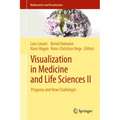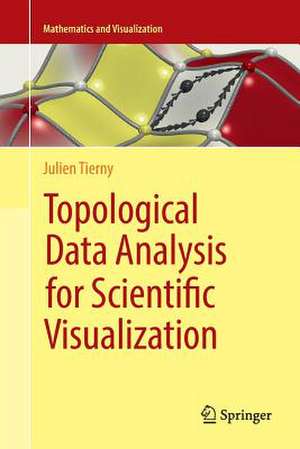Topological Data Analysis for Scientific Visualization: Mathematics and Visualization
Autor Julien Tiernyen Limba Engleză Paperback – 4 iun 2019
Theoretical concepts are presented in a painstaking but intuitive manner, with numerous high-quality color illustrations. Key algorithms for the computation and simplification of topological data representations are described in detail, and their application is carefully demonstrated in a chapter dedicated to concrete use cases.
With its fine balance between theory and practice, "Topological Data Analysis for Scientific Visualization" constitutes an appealing introduction to the increasingly important topic of topological data analysis for lecturers, students and researchers.
| Toate formatele și edițiile | Preț | Express |
|---|---|---|
| Paperback (1) | 923.81 lei 6-8 săpt. | |
| Springer International Publishing – 4 iun 2019 | 923.81 lei 6-8 săpt. | |
| Hardback (1) | 929.92 lei 6-8 săpt. | |
| Springer International Publishing – 29 ian 2018 | 929.92 lei 6-8 săpt. |
Din seria Mathematics and Visualization
- 20%
 Preț: 935.20 lei
Preț: 935.20 lei - 18%
 Preț: 960.93 lei
Preț: 960.93 lei - 18%
 Preț: 1110.41 lei
Preț: 1110.41 lei - 20%
 Preț: 994.26 lei
Preț: 994.26 lei - 18%
 Preț: 1220.57 lei
Preț: 1220.57 lei - 18%
 Preț: 958.38 lei
Preț: 958.38 lei - 15%
 Preț: 654.62 lei
Preț: 654.62 lei - 20%
 Preț: 997.38 lei
Preț: 997.38 lei - 15%
 Preț: 645.47 lei
Preț: 645.47 lei - 5%
 Preț: 1101.58 lei
Preț: 1101.58 lei - 20%
 Preț: 992.44 lei
Preț: 992.44 lei - 20%
 Preț: 1284.47 lei
Preț: 1284.47 lei - 20%
 Preț: 656.69 lei
Preț: 656.69 lei - 20%
 Preț: 476.68 lei
Preț: 476.68 lei - 20%
 Preț: 1273.08 lei
Preț: 1273.08 lei - 15%
 Preț: 649.54 lei
Preț: 649.54 lei - 20%
 Preț: 335.36 lei
Preț: 335.36 lei - 20%
 Preț: 646.95 lei
Preț: 646.95 lei - 20%
 Preț: 651.75 lei
Preț: 651.75 lei - 20%
 Preț: 657.99 lei
Preț: 657.99 lei - 18%
 Preț: 1223.74 lei
Preț: 1223.74 lei - 20%
 Preț: 333.72 lei
Preț: 333.72 lei - 20%
 Preț: 709.98 lei
Preț: 709.98 lei - 18%
 Preț: 1236.38 lei
Preț: 1236.38 lei - 20%
 Preț: 992.26 lei
Preț: 992.26 lei - 20%
 Preț: 648.44 lei
Preț: 648.44 lei - 20%
 Preț: 1158.59 lei
Preț: 1158.59 lei - 20%
 Preț: 330.66 lei
Preț: 330.66 lei - 18%
 Preț: 963.91 lei
Preț: 963.91 lei - 15%
 Preț: 653.98 lei
Preț: 653.98 lei - 20%
 Preț: 991.94 lei
Preț: 991.94 lei - 18%
 Preț: 958.07 lei
Preț: 958.07 lei
Preț: 923.81 lei
Preț vechi: 1154.77 lei
-20% Nou
Puncte Express: 1386
Preț estimativ în valută:
176.79€ • 182.64$ • 147.14£
176.79€ • 182.64$ • 147.14£
Carte tipărită la comandă
Livrare economică 26 martie-09 aprilie
Preluare comenzi: 021 569.72.76
Specificații
ISBN-13: 9783319890791
ISBN-10: 3319890794
Pagini: 150
Ilustrații: XV, 150 p. 84 illus. in color.
Dimensiuni: 155 x 235 mm
Greutate: 0.25 kg
Ediția:Softcover reprint of the original 1st ed. 2017
Editura: Springer International Publishing
Colecția Springer
Seria Mathematics and Visualization
Locul publicării:Cham, Switzerland
ISBN-10: 3319890794
Pagini: 150
Ilustrații: XV, 150 p. 84 illus. in color.
Dimensiuni: 155 x 235 mm
Greutate: 0.25 kg
Ediția:Softcover reprint of the original 1st ed. 2017
Editura: Springer International Publishing
Colecția Springer
Seria Mathematics and Visualization
Locul publicării:Cham, Switzerland
Cuprins
1. Introduction.- 2. Background: 2.1 Data representation.- 2.2 Topological abstractions.- 2.3 Algorithms and applications.- 3. Abstraction: 3.1 Efficient topological simplification of scalar fields.- 3.2 Efficient Reeb graph computation for volumetric meshes.- 4. Interaction: 4.1 Topological simplification of isosurfaces.- 4.2 Interactive editing of topological abstractions.- 5. Analysis: 5.1 Exploration of turbulent combustion simulations.- 5.2 Quantitative analysis of molecular interactions.- 6. Perspectives: 6.1 Emerging constraints.- 6.2 Emerging data types.- 7. Conclusion.
Recenzii
“The book under review is built as a systematic textbook that pinpoints the elements of data visualization and offers the theoretical background for this task. … The book is written in an accessible style, suitable for undergraduates and graduates alike, and only requires a minimal algorithmic background.” (Irina Ioana Mohorianu, zbMATH 1387.00020, 2018)
Notă biografică
Julien Tierny received the Ph.D. degree in Computer Science from Lille 1 University in 2008 and the Habilitation degree (HDR) from Sorbonne Universités UPMC in 2016. He is currently a CNRS permanent research scientist, affiliated with Sorbonne Universities (LIP6, UPMC Paris 6, France) since September 2014 and with Telecom ParisTech from 2010 to 2014. Prior to his CNRS tenure, he held a Fulbright fellowship (U.S. Department of State) and was a post-doctoral research associate at the Scientific Computing and Imaging Institute at the University of Utah. His research expertise includes topological data analysis for scientific visualization. Dr. Julien Tierny received several awards for his research, including best paper awards (IEEE VIS 2017, IEEE VIS 2016, IEEE SciVis Contest 2016, EGPGV 2013). He is the lead developer of the Topology ToolKit (TTK), an open source library for topological data analysis.
Textul de pe ultima copertă
Combining theoretical and practical aspects of topology, this book delivers a comprehensive and self-contained introduction to topological methods for the analysis and visualization of scientific data.
Theoretical concepts are presented in a thorough but intuitive manner, with many high-quality color illustrations. Key algorithms for the computation and simplification of topological data representations are described in details, and their application is carefully illustrated in a chapter dedicated to concrete use cases.
With its fine balance between theory and practice, "Topological Data Analysis for Scientific Visualization" constitutes an appealing introduction to the increasingly important topic of topological data analysis, for lecturers, students and researchers.
With its fine balance between theory and practice, "Topological Data Analysis for Scientific Visualization" constitutes an appealing introduction to the increasingly important topic of topological data analysis, for lecturers, students and researchers.
Caracteristici
84 color images, including 20 high quality illustrations in the background section, nicely introducing in images the key concepts of topological data analysis Special chapter on application examples, illustrating concrete use cases of topological data analysis pipelines in combustion and chemistry Special chapter on the perspectives of topological data analysis regarding the upcoming generation of super-computers (exascale computing)
